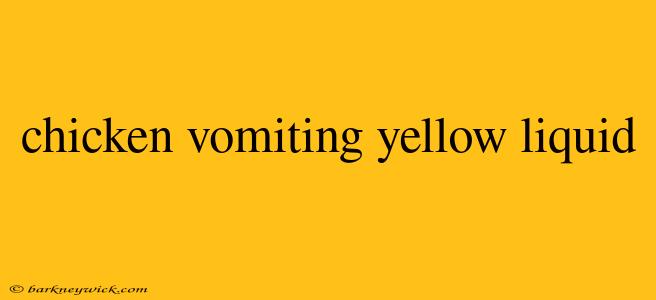When Your Chicken's Dinner Comes Back Up: Understanding Yellow Vomit in Chickens
I'll never forget the day I found my prized hen, Henrietta, looking decidedly unwell. She was hunched over, feathers ruffled, and a bright yellow liquid had pooled beneath her beak. My heart sank - what was wrong with my beloved bird? That's when I started my frantic search for answers, a journey that led me to the world of poultry health and the unsettling reality of chicken vomit.
Understanding Chicken Vomit: More Than Just a Mess
It's important to remember that "vomiting" in chickens isn't exactly the same as in humans. They don't forcefully expel stomach contents like we do. Instead, they regurgitate, often bringing up a yellowish-green liquid called "regurgitant."
The Yellow Liquid: What's Going On?
This yellowish-green liquid is usually a combination of bile, undigested food, and stomach fluids. While it can be alarming, it's not always a sign of serious illness. Several factors can lead to this:
- Stress: Just like us, chickens can get stressed, especially during changes like moving to a new coop, introducing new flock members, or experiencing harsh weather conditions.
- Overeating: While they're known for their appetites, sometimes chickens eat more than they can handle, leading to regurgitation.
- Dietary Issues: Inadequate or poorly balanced diets can cause digestive upset, leading to regurgitation.
- Internal Parasites: Worms and other parasites can irritate the digestive tract, leading to regurgitation and other symptoms.
- Infections: Viral and bacterial infections can cause illness and lead to a variety of symptoms, including regurgitation.
Don't Panic, But Do Act:
If you find your chicken regurgitating yellow liquid, here's what you can do:
- Isolate the Chicken: To prevent spreading any potential infection, immediately isolate the affected chicken from the rest of the flock.
- Observe Carefully: Note any other symptoms, such as lethargy, loss of appetite, diarrhea, or difficulty breathing. These can help you determine the cause of the regurgitation.
- Provide Fresh Water: Ensure the chicken has access to fresh water, as dehydration can be a major concern.
- Seek Veterinary Help: If the regurgitation persists for more than a day or is accompanied by other concerning symptoms, it's crucial to consult an avian veterinarian.
Preventing Regurgitation:
- Reduce Stress: Provide a calm and comfortable environment for your chickens, with adequate space, shade, and hiding spots.
- Balanced Diet: Feed a high-quality, balanced diet that includes a variety of grains, greens, and grit.
- Regular Deworming: Prevent parasites by deworming your chickens regularly.
Final Thoughts:
As a chicken owner, I learned a valuable lesson that day with Henrietta. While chicken regurgitation can be unsettling, it's not always a cause for immediate panic. By understanding the potential causes, observing your bird's behavior, and seeking professional help when needed, you can ensure the well-being of your feathered friends.
Remember, a healthy chicken is a happy chicken!
